Hexnode MDM
The drive towards ever greater control over hardware connected and connecting to a corporate network requires several trade-offs for privacy, self-determination, and purpose. Even as BYOD and its variants become more prevalent thanks to slashed IT procurement budgets, users are expected to accept potentially strict controls over how they use their own devices in a corporate environment.
And of course, there are the devices the organization does own.
- Interested in Hexnode? Check out the website here
All can be controlled using Mobile Device Management (MDM) software. Installed on individual devices and administered from a central server (sometimes in the cloud), MDM (an umbrella term for several similar, linked technologies) simplifies device security, oversees the location, and rolls out updates.
Hexnode is a dedicated MDM product that is used by various household names worldwide. In this review we'll look at why you should consider this mobile device and application management solution.
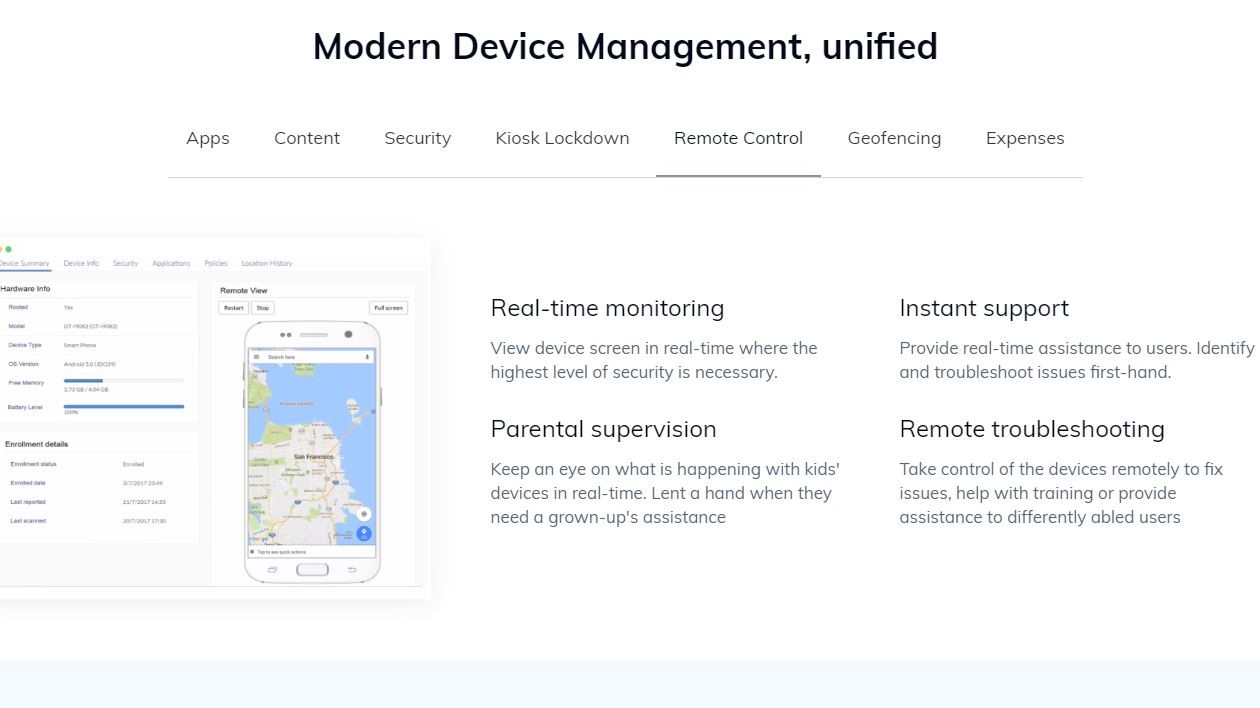
Features
Hexnode MDM provides management for a wide selection of usage concerns: device, application, security, content, expense, BYOD, and kiosk.
Its wide selection of features allow you to manage wireless device enrolment and configuration, blacklist, and whitelist websites for mobile browsers, and create separate work profiles for BYOD. Windows hybrids and tablets can be securely provisioned, and devices tracked.
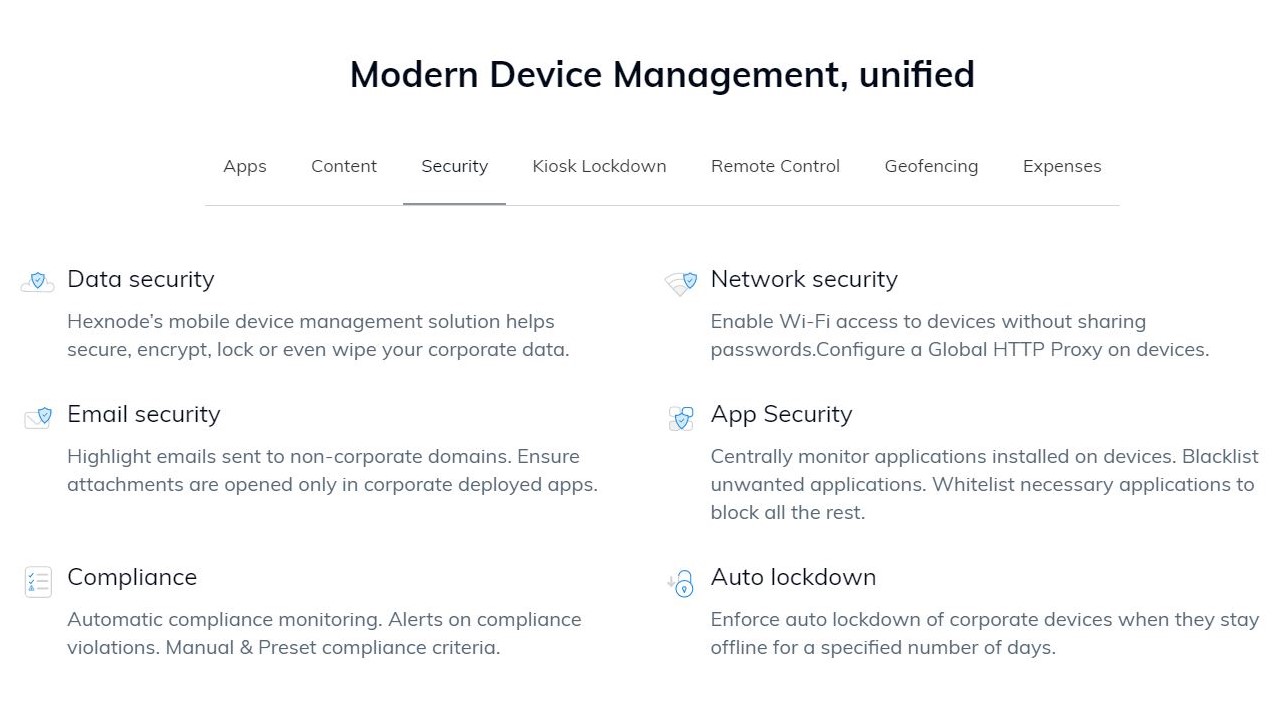
Comprehensive security options force stringent password rules, system and application-level encryption, web filtering, and data loss prevention (DLP) strategies. These include restricting data transfer through USB, Bluetooth, and wireless tethering, and channelling data through corporate VPNs. Work profiles can be containerized, and copy-paste disabled.
Device theft prevention and location technologies are included in Hexnode, which include the ability to wipe corporate data selectively and remotely. Dynamic grouping allows the roll-out of policies, settings, app updates, and other MDM staples, and apps can be remotely installed on supported mobiles.
Kiosk mode can be configured for devices, too, ensuring that just one or two apps can be accessed. For user support, Hexnode includes remote control software.
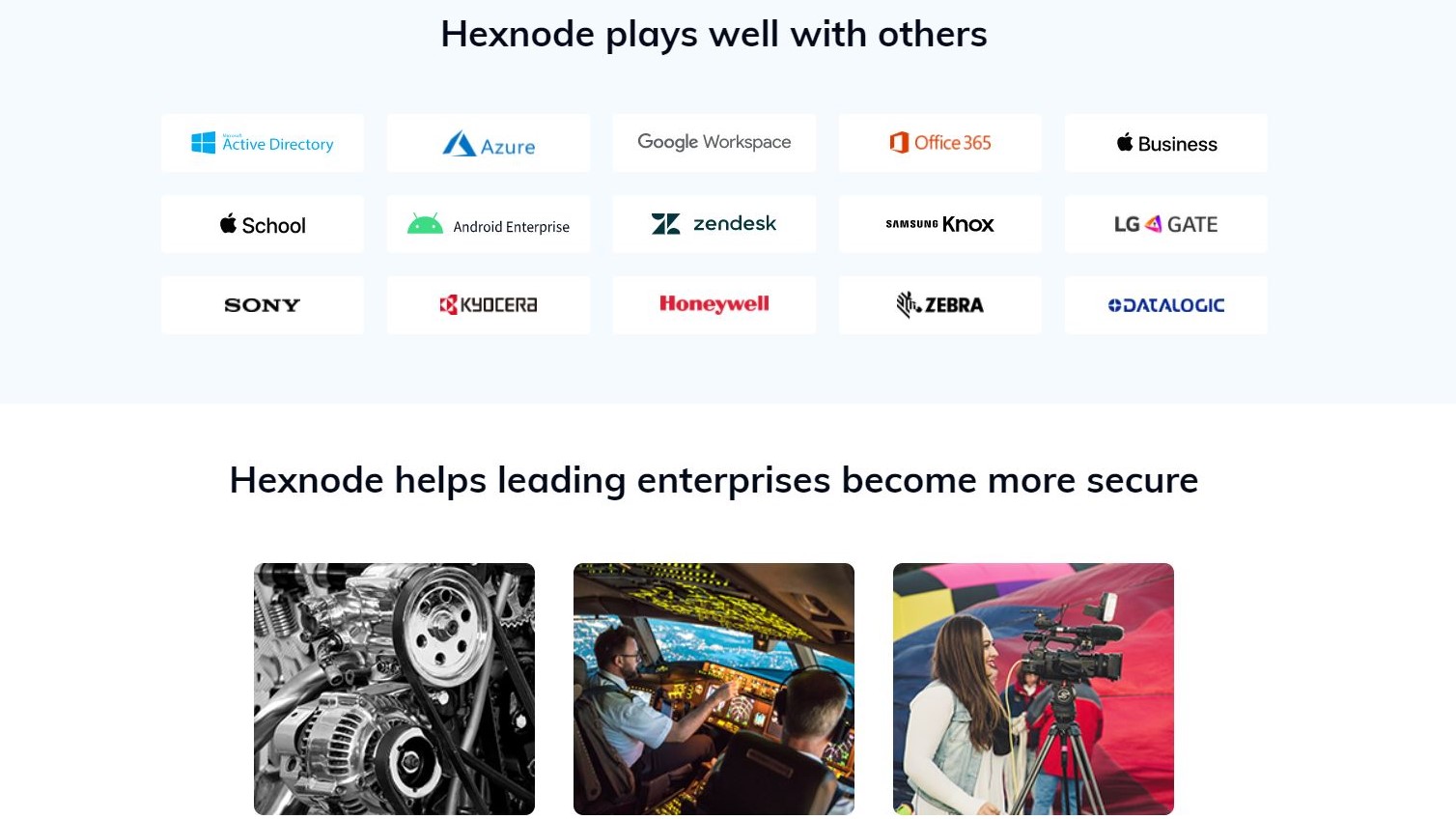
Beyond MDM, Hexnode also offers three Unified Endpoint Management (UEM) packages, with advanced features for managing non-mobile hardware. This also stretches to integrations with key business and productivity suites such as Google Workspace, Active Directory, Office 365, Zendesk, and others.
Installation and setup
Hexnode offers on-premises and cloud deployment. On-premises Hexnode's MDM server can be completely managed and secured, with data and hardware restricted from third-party access.
However, if your organization has a limited IT presence, the cloud-based MDM solution is more appropriate. Hexnode's cloud MDM solution can be accessed via the internet, without the headache of resolving server issues.
On individual devices, zero-touch enrolment is available, with support for Apple DEP, Android Enterprise ZTE, Samsung Knox, and even flashing custom Android ROMs with Hexnode preconfigured. This potentially takes the strain out of device enrollment for the end user.
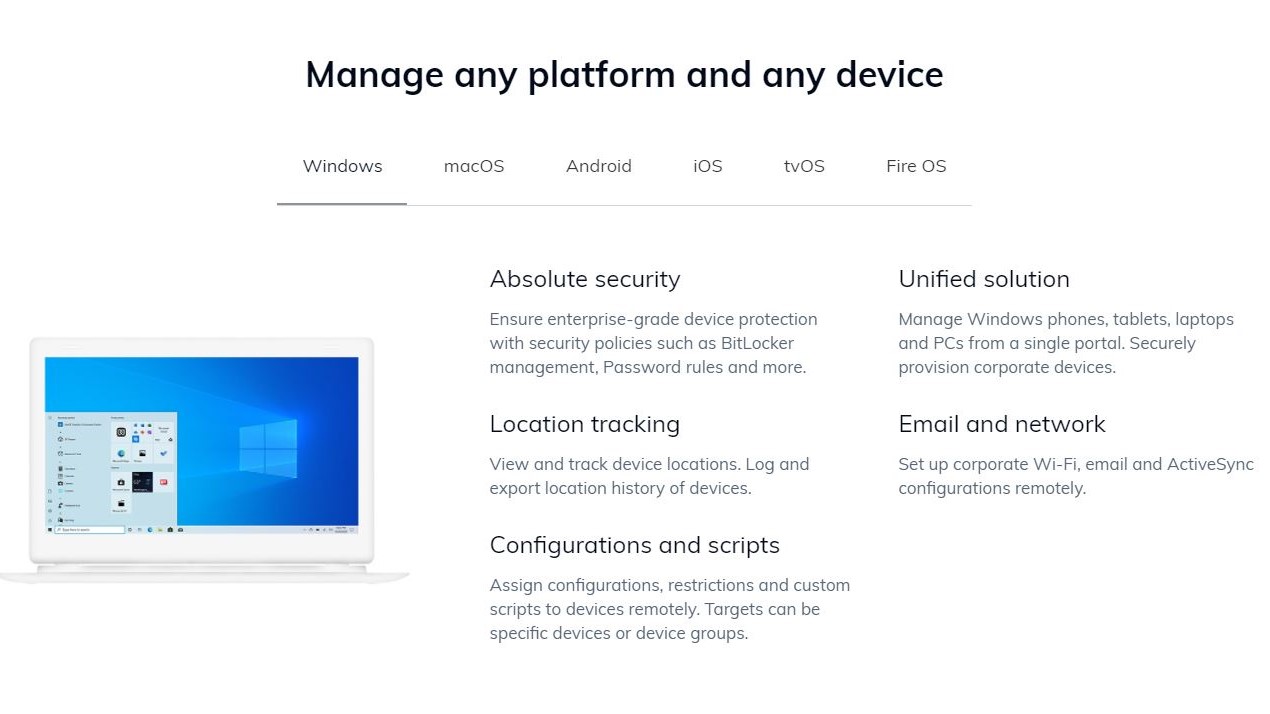
Compatibility
Hexnode offers wide compatibility with mobile devices. Android phones and tablets and iPhones can be used with Hexnode's MDM, along with Windows 10 laptops, tablets, and hybrids. As such, most (if not all) mobiles and portables in your organization can be managed using Hexnode.
Beyond MDM and into the realm of Hexnode's UEM offerings (see below), macOS laptops and desktops are compatible, as well as tvOS and Fire OS media streaming systems.
There is also support for rugged devices, IoT hardware and digital signage software.
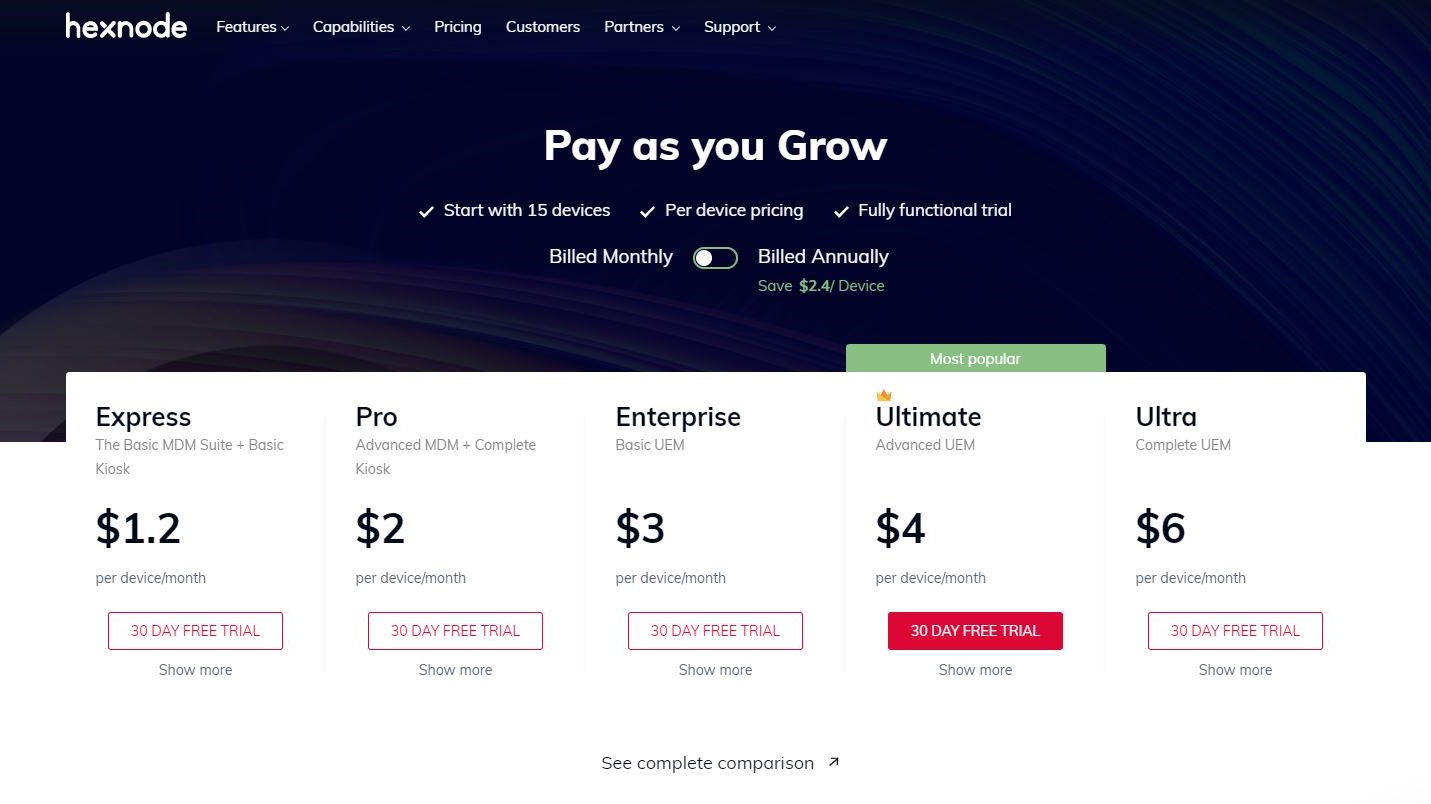
Plans and pricing
Hexnode offers pay as you grow licensing and pricing, with additional features and devices available as required.
The Express option offers basic MDM and kiosk functionality for $1.00 per device per month.
Pro is just $1.80 device/month for an advanced MDM and complete kiosk, and a considerable increase in functionality, from DEP, ZTE, and Knox enrolment to VPN, blacklist, and whitelist, and more.
Enterprise is $2.80 device/month and moves Hexnode functionality toward UEM, adding further features, such as macOS, tvOS, and Windows support, more VPN, app management, content management, and Office 365-based enrollment.
Hexnode's Ultimate $3.80 device/month package improves on this further with app management for desktops operating systems, control of the iOS home screen layout, pre-approved enrolment, for starters
Finally, Ultra is $5.80 device/month, boasts the full features of all the other packages alongside a focus on security and desktop system management. This is a full UEM solution.
Each Hexnode package also includes provision for one or more technician licences.
Before subscribing to any of those deals, however, Hexnode offers a fully functional 30-day free trial. This can give you the opportunity to fully evaluate the solution before committing to a package.
Final verdict
In a marketplace that includes big names pushing their mobile device management suites as part of a wider package that can also include server and network hardware, Hexnode is a refreshing alternative.
Focusing on the software you'll need to manage your organization's mobile devices, Hexnode just needs a working network and a suitable server to run on. Alternatively, there is the option to host Hexnode in the cloud, rather than on-premises.
Multiple MDM and UEM packages are available, each with a per-device license. If you're simply looking for a way to manage iPhone and Android devices used by your colleagues, the MDM option from Hexnode is affordable and effective. But for a more in-depth device management experience that covers desktops, IoT, rugged devices, media streamers, and other endpoints, consider Hexnode's UEM packages.
- We've also featured the best MDM solutions
0 comments:
Post a Comment